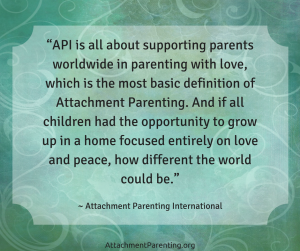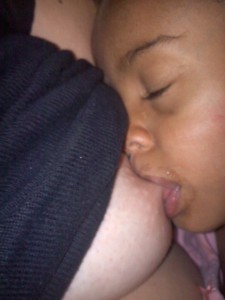 I am grateful to be an Attachment Parent.
I am grateful to be an Attachment Parent.
I don’t feel that we need to be labeled in order to define our type of parenting; however, being a part of a community with like-minded parents reminds me that I am not alone.
Yes, we are all different. We all choose to parent differently. The families we come from and the families we are raising conjure up many things around the holiday season. At least for me.
My favorite time of year is upon us, and yet, so much about it feels different. We spent Thanksgiving as a small group, and the missing pieces magnified the reality of what family looks like and what it has evolved into over time.
We all define and experience family differently.
As we come into this world, we are innocent, wide-eyed and unsuspicious. The world is uncontaminated, and our canvases are bare. We don’t know anything about pain, resentment, sadness, loss, judgement, hate. We don’t know what a label is or why anyone must define us by one. We come into this world needing and seeking a few simple things. We want to be loved, nurtured and heard.
We spend our lives wanting and needing to be heard and understood.
From the moment we first lay eyes upon our mother’s face, we feel we belong. We feel safe. We are home. From that point forward, through each experience, through all the light, through all the darkness, the ways in which we experience love and family evolve and take on lives of their own.
Decisions are made for us, separations disconnect us, rules and regulations attempt to govern us, facades deceive us, and choices divide us. Love runs through, and yet, something always seems to be missing. As we grow into adults, the need to be heard only grows stronger. We are often misunderstood and those feelings we are left with emerge into deeper cries for answers, for clarity, for truth.
Our innocence shifts at a certain point as we are exposed to the sometimes harsh realities of the world. Something happened, and we no longer felt good enough. Something else happened, and we thought we needed to be something or someone else in order to gain acceptance. We thought we needed to please and obey and squeeze ourselves into molds that the masses set before us. If you stray from that, you are different, you are weird, you are wrong.
Yes, this is what we are told and led to believe by the people who simply can’t bear the fact that we are not conforming to what makes everyone else comfortable. You are out of place, and you are displacing the system. Please get back in the queue and follow the leader, they say.
Although I never allowed myself to succumb to society’s desperate plight to mass-produce me, I was still greatly affected. I still am affected, and I know that this contributes to my quest for what this life is all about on a daily basis. Human, honest, loving, kind and meaningful connection is all I’ve ever wanted. It’s what I am most open to and in search of. In my journey through this life, thus far, I can tell you that it is through presence and connection that I experience the purest and truest love.
I am often discouraged by the highly opinionated, judgmental, divided, jump-on-the-Twitter-trend bandwagon mentality we are surrounded by. I find it difficult to even hear my own voice through all of the noise. I find it difficult to remain centered as I witness the constant debates telling you what’s right and wrong, black and white, acceptable and unacceptable. If we allow, the social media machines will infiltrate our lives with more stimulation than we can possibly process, and our connections to ourselves and those around us will be left with mere shadows and caricatures of who and what they once were.
Much research is taking place in the world of psychology and how it pertains to social media. In addition, many opinions are being shared these days, revealing narcissism as an epidemic based on those seeking acceptance via likes and feedback as they broadcast their points of view and selfies through the social network media megaphone.
I find it sad, even if data reveals it’s accuracy, that the Millennial Generation — although I don’t feel it’s limited to them — is now being labeled in this way, which only further instills the deep-seated insecurity and underlying feelings of inadequacy that so many of us struggle with.
The internet provides a stage and an audience at our daily disposal. Sadly, the constant need to be seen as the best, and the portrayal of a life that others envy and dream of, is a full-time job for many. Not much is private anymore, and nothing can really shock us. The praise and approval one thinks they are seeking often lead to emptiness and more insecurity.
This cycle continues, masked in a different face, and breeds more of what most of us struggled with growing up. We’re still working through the disharmony of it all.
There are certainly many benefits to social media. I just feel we need to take the time to encourage our youth to connect to what is true and real around us and allow for our own minds and voices to be clear amongst it all.
I love my boys with all of my heart. I am present to them, to their needs and to who they truly are as individuals and human beings. It is this presence that allows me to support, guide and nurture them along the paths they are meant to pave in their own lives. We spend a lot of time in nature, and it is there that I find we all gain the best education and connection with ourselves. We love exploring. We love adventures. Their imaginations are endless. We are free.
I believe it is every human’s right to be given the freedom to be themselves — to fully express and shine as their unique being, whatever that looks like. You are beautiful. You are enough. You are you.
I choose to exist in a world where personal relating and human connection are more prevalent than the fabricated, manufactured images we mistake for reality.
I sat down to write a piece about the holidays and what I am thankful for. This is what came out.
I believe the holidays can be a time of wonderful joy and togetherness, and they can also magnify the imperfections within your own family and the world around us. I am filled with love and gratitude, yet the lack of unity saddens me. It triggers the facts of my existence and inspires me to initiate change again. I wish things were different in certain areas. I wish we were all closer.
I am thankful for my life. I am thankful for my family. I am thankful for my husband and the greatest gift and honor of being a mother to our two sons. I am thankful for the food I eat and the roof over my head. I am thankful for my health and each breath I take. I am thankful for the depth of love and compassion I feel and am connected to. I am thankful to be a source of love for others. I am thankful for the service my family and I provide to those in need.
I am thankful for connection and for the many advantages the internet provides us with each day. Through this medium, I am able to relate openly and honestly. As I often say: When you hear me, I feel understood. I feel connected to the world. I believe this is all any of us want.
The name-calling, the labels, the fear instilled upon us, the animosity. Through it all, we will only grow stronger and continue to evolve into who and what we are meant to. I choose love and truth. Today and always.
Wishing you a delightful and compassionate holiday season.

 This was only the beginning.
This was only the beginning.







